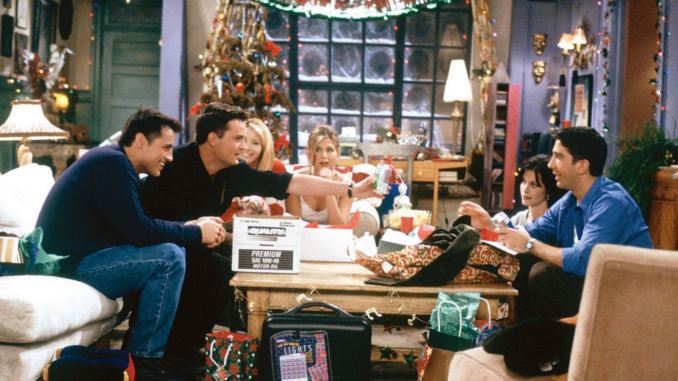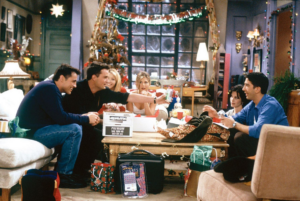
It’s telling that I didn’t watch the Friends series finale live.
Even now, sitting down to write this look-back on it, I’m struck by this whine of really? Like, do we REALLY need to spill more ink or pixels over this show? There have been pop-up cafes and books and, especially after star Matthew Perry’s (the best Friends friend, Chandler) awful passing last year, a gazillion think pieces have been written about the sitcom to end all sitcoms and how it paved the way for newer comedies like The Big Bang Theory, How I Met Your Mother, and Happy Endings.
But, to paraphrase the show’s theme song, would I be where I am without Friends? I’m 44, which means I’m in that weird gray area of not identifying as a member of Gen X or as a Millennial (way back in 2011, Slate’s Doree Shafrir dubbed ours Generation Catalano, a reference to another game-changing TV series). When Friends premiered in 1994, I was an awkward high school freshman who knew I wanted to be anywhere but where I was (which, in my case, was Little Rock, Arkansas with all the conformity and conservativeness of the rest of flyover country). In one early episode of Friends, Jennifer Aniston’s Rachel describes a pair of her roommate Monica’s (Courteney Cox) shoes as “those little clunky Amish things you think go with everything.” Hey! I had shoes like that! And they did go with everything!

Throughout the series’ 10-season run, Friends wasn’t so much a parent as an older sibling I saw go through everything ahead of me. I learned how to break from the comfort zones of my high school and college years. I learned that chosen families were just as important as blood relatives and that, in either case, you’re gonna need a support system if you’re going to survive in adulthood. I embraced the show’s ludicrous world of giant apartments, in which you stored an unending supply of stylish wardrobes, and had the credit card debit to prove it.
Friends also taught me about TV. I did whatever the 2002 word for binge watching was when I came back from study abroad to find VCR recordings of a half seasons’ worth of episodes that a roommate had made for me, courtesy of her parents’ basement TV. I remember thinking how weird it was that they always went out to eat at the same fancy restaurants (sets are expensive to build and take up space, college-aged Whitney).
By the time the series finale rolled around, I thought I had outgrown Friends. I was then in my 20s myself, living in my own big city and making my own stupid mistakes with friendships, dating, and money (I think I was actually at my second job the night the finale aired; see the above comment about credit card debt). At some point, I saw the episodes and knew the basics: Rachel was back together with David Schwimmer’s Ross (again!), Monica and Chandler were moving to the suburbs (why? That apartment was amazing), Lisa Kudrow’s Phoebe had married outside the tribe (hi, Paul Rudd), and Matt Le Blanc’s Joey was perpetually single and living with a baby chicken, baby duck, and broken Foosball table.
But rewatching the finale now made me nostalgic and a little sad. One of the plots involves Ross and Phoebe frantically driving around New York and New Jersey in the hopes of stopping Rachel from boarding a plane to Paris. He comes home, defeated, only to have an actual answering machine recording of her begging a flight attendant to let her off the plane so she could be with him. Apple killed off any remaining uncertainty any of us would ever have about each others’ whereabouts when it launched the iPhone in 2007.
Another is Monica and Chandler’s shock and amazement that they were going to be adopting two babies instead of one, as birth mother Erica (Anna Faris) didn’t realize she was pregnant with twins. The coupling of today’s worlds of gender reveal parties and 3D sonograms with Monica’s well-documented, type-A obsessiveness means it’s unlikely those kids wouldn’t have already had a nursery of monogrammed stuffed elephants and their Stokke high chairs already assembled.
What I feel in rewatching the Friends finale is that it’s on the precipice of the world’s change but hasn’t yet fallen over the edge. It makes me think of myself and my life when the finale aired as my mind flashes forward to where I am now. I think about all the joke jobs and D.O.A. love lifes for myself and my own friends from that time (and now). I wonder if the six fictitious friends at the center of that story are still close or if they’ve grown apart, as I have from some of my own friends from the early aughts.
That I still think about this show at all—that myself and so many others can quote and reference it without straining; that the show was so powerful that people learned English by watching it—demonstrates how much this show was lightning in a bottle.
But, for me, Friends is a time capsule of my journey into adulthood. It’s omnipresence on streaming service Max and on T-shirts and mugs the world over serve as ready-made déjà vus of my own memories. Which means, without a doubt, it’ll always be there for me, too.
Whitney Friedlander is an entertainment journalist with, what some may argue, an unhealthy love affair with her TV. A former staff writer at both Los Angeles Times and Variety, her writing has also appeared in Cosmopolitan, Vulture, The Washington Post and others. She lives in Los Angeles with her husband, son, and three daughters (two of whom are cats).
